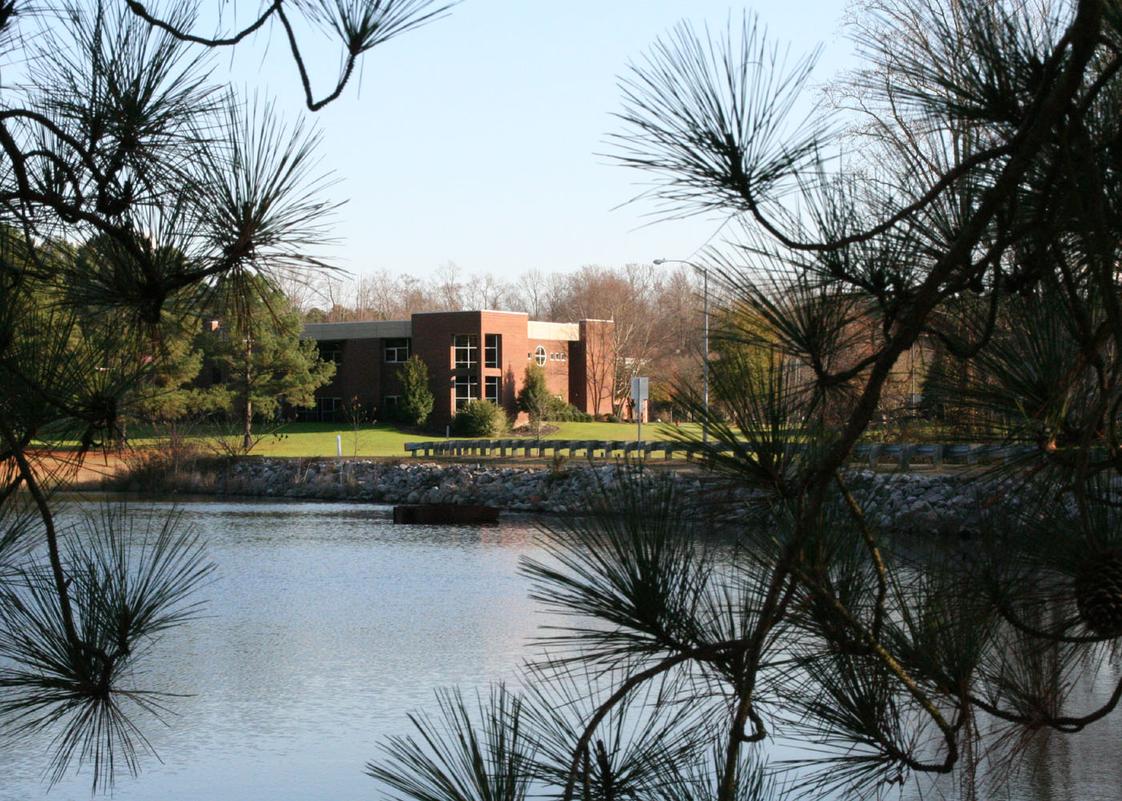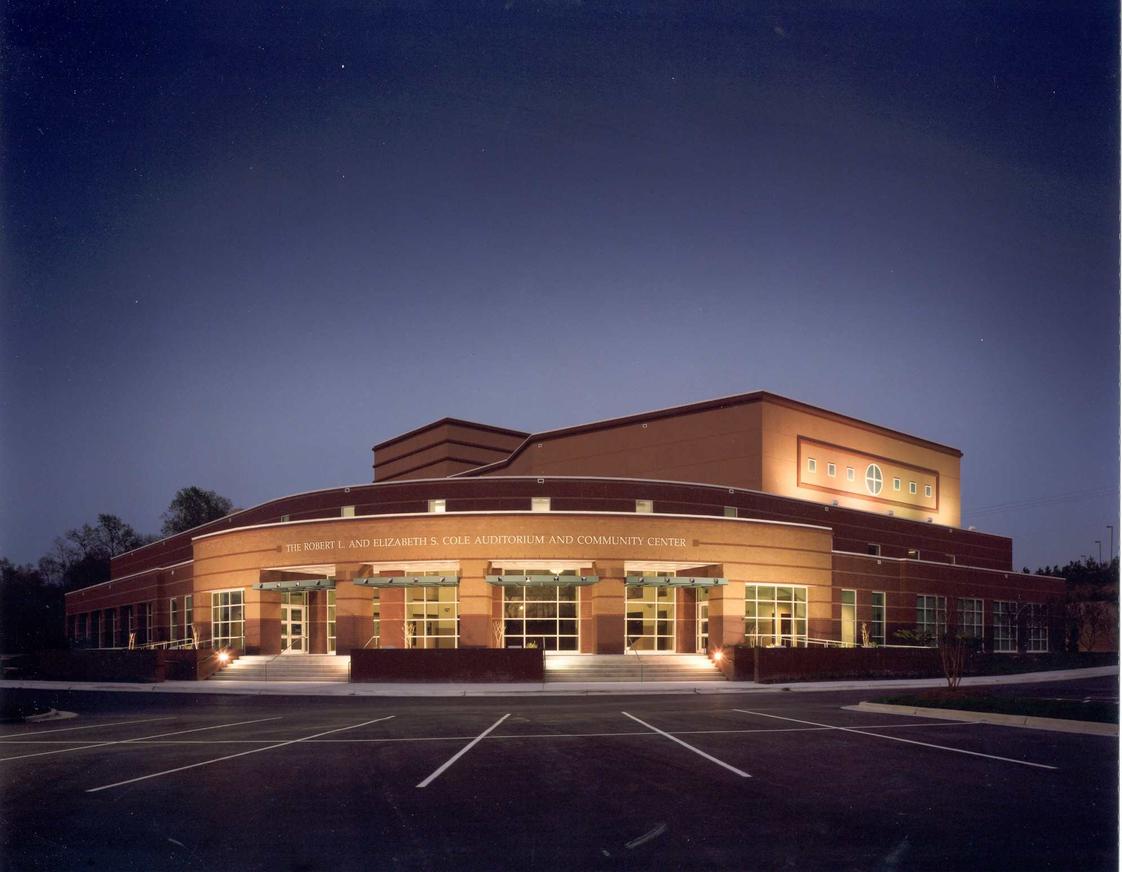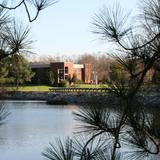- The mission of Richmond Community College is to provide quality educational opportunities and community services, to offer workforce training and retraining, and to support economic development.
School Highlights
Richmond Community College serves 3,018 students (24% of students are full-time).
The college's student-teacher ratio of 12:1 is lower than the state community college average of 13:1.
Minority enrollment is 56% of the student body (majority Black), which is more than the state average of 48%.
Quick Facts (2025-26)
- Enrollment: 3,018 students
- In-state tuition: $2,382
- Out-state tuition: $8,526
- Student-teacher ratio: 12:1
- Minority enrollment: 56%
- Source: Integrated Postsecondary Education Data System (IPEDS)
Top Rankings
Richmond Community College ranks among the top 20% of public schools in North Carolina for:
Category
Attribute
Diversity
School Resources
School Overview
The teacher population of 256 teachers has stayed relatively flat over five years.
Richmond Community College
(NC) Community College Avg.
Carnegie Classification
Associate's Colleges: Mixed Transfer/Career & Technical-Mixed Traditional/Nontraditional
Associate's Colleges: Mixed Transfer/Career & Technical-High Nontraditional
Institution Level
At least 2 but less than 4 years
At least 2 but less than 4 years
Institution Control
Public
Public
Total Faculty
256 staff
256 staff
School Calendar
Student Body
The student population of Richmond Community College has grown by 16% over five years.
The student-teacher ratio of 12:1 has increased from 9:1 over five years.
The Richmond Community College diversity score of 0.70 is more than the state average of 0.66. The school's diversity has declined by 6% over five years.
Total Enrollment
3,018 students
2,579 students
Student-Teacher Ratio
12:1
13:1
# Full-Time Students
729 students
766 students
# Part-Time Students
2,289 students
1,813 students
# Enrollment Undergraduate
301 students
316 students
# Full-Time Undergraduate Students
729 students
766 students
# Full-Time Graduate Students
n/a
22 students
# Part-Time Undergraduate Students
2,289 students
1,990 students
# Part-Time Graduate Students
n/a
3 students
Total Dormitory Capacity
n/a
717 students
% American Indian/Alaskan
10%
1%
% Asian
1%
3%
% Hispanic
7%
13%
% Black
29%
21%
% White
44%
52%
% Hawaiian
n/a
1%
% Two or more races
3%
3%
% Non Resident races
n/a
1%
% Unknown races
6%
5%
Diversity Score
0.70
0.66
College Completion Rate (Students who graduate in less than 4 years)
34%
37%
College Completion Rate (Students who graduate in 4 years or more than 4 years)
n/a
43%
Average Graduate Earnings (10 Years)
$25,200
$27,500
Tuition and Acceptance Rate
The public in-state tuition of $2,382 is less than the state average of $3,915. The in-state tuition has declined by 6% over four years.
The public out-state tuition of $8,526 is less than the state average of $9,508. The out-state tuition has stayed relatively flat over four years.
In-State Tuition Fees
$2,382
$3,915
Out-State Tuition Fees
$8,526
$9,508
Tuition Notes
$76/hour for in-state students, $268/hour for out-of-state students
% Students Receiving Some Financial Aid
95%
82%
Median Debt for Graduates
n/a
$11,865
Median Debt for Dropouts
n/a
$5,846
Acceptance Rate
n/a
82%
SAT Reading
n/a
488
SAT Math
n/a
498
ACT Composite
n/a
20
ACT English
n/a
13
ACT Math
n/a
16
Source: 2024 (or latest year available) Integrated Postsecondary Education Data System (IPEDS) , School Administrators
School Notes
- In 1963, the General Assembly of North Carolina established a system of community colleges and technical institutes which was to be governed by the State Board of Education and a local board of trustees for each institution. In April 1964, the North Carolina Department of Community Colleges, upon recommendation of the Commission of Public Education beyond the High School Level, established Richmond Technical Institute. Seven months later, the voters of Richmond County authorized a bond issue and a tax levy for construction and support of Richmond Technical Institute. In October 1980, the name was changed to Richmond Technical College. In July 1987, the name was again changed to Richmond Community College when the North Carolina General Assembly approved Richmond Community College's application for community college status. Our curriculum programs focus on high technology with a strong college transfer core. Our Occupational Extension efforts provide new and expanding industry training, in-plant training and public service training. Our Literacy efforts reach a high percentage of non-school completers. Richmond Community College offers two associate degree programs designed to allow a seamless transition to four-year institutions. The Associate in Arts program is designed for students who desire a bachelor's degree and/or pre-professional training in areas other than the fine arts and natural/biological/mathematical sciences. Students who plan to major in such disciplines as liberal arts and liberal arts education, sociology, psychology, humanities, music, art, business, economics, history and political science should consult a counselor about enrolling in the A.A. program. The Associate in Science program is designed for students who desire a bachelor's degree and/or pre-professional training in natural, biological or mathematical disciplines. The college offers Degrees & Certificates in Arts & Science, Business Administration, College Transfer, Engineering, Health Science and Public Service. Richmond Community College is accredited by the Commission on Colleges of the Southern Association of Colleges and Schools to award Associate in Arts, Associate in Science, and Associate in Applied Science Degrees. RCC is a member of the North Carolina Community College System.
Frequently Asked Questions
How much does Richmond Community College cost?
Richmond Community College's tuition is approximately $2,382 for In-State students and $8,526 for Out-State students.
What is Richmond Community College's ranking?
Richmond Community College ranks among the top 20% of community college in North Carolina for: Diversity in US community colleges and Percent of students receiving financial aid.
Recent Articles

Community College Success Rates 2025: Outcomes & Trends
Updated 2025 analysis of community college success rates, completion, transfer, costs, enrollment, and strategies that shape student outcomes.

Community Colleges in 2025: Combating Stereotypes with Impact
Updated insights on how community colleges are dispelling myths, growing enrollment, and expanding pathways in 2025.

2025 FAFSA Changes Explained for Community College Students
A comprehensive guide to 2025 FAFSA changes, what community college students must know, new eligibility rules, timelines, and tips to maximize federal aid.















